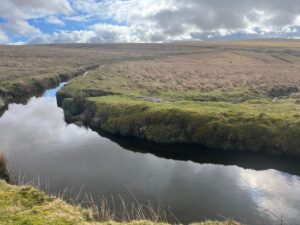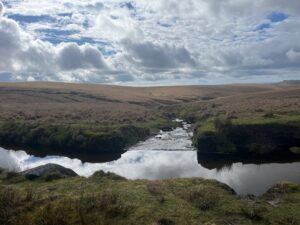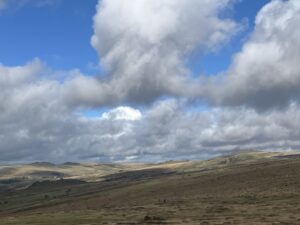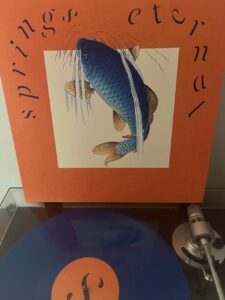In her latest missive from Devon, Kirsteen McNish searches for elusive megaliths.

As if space has risen through image
and I am no longer travelling home but outwards
and into this
— Lavinia Greenlaw
I wake and let light into the room after a night of biblical rain that soothed me to sleep. Everything looks saturated, like an over-wash of inks on blotting paper — exaggerated, condensed and yet not quite right.
Last night my child only coughed once rather than the umpteen times where she cannot catch her breath from a virus that just won’t let go of her — I am woozy from suddenly being awaked from cortisol-fuelled dreams, juddery and hyper-vigilant that she can breathe properly. She murmurs in her sleep — bent forward in child’s pose, feet tucked under her like a frog, and I marvel at her bodily plasticity as I pull her quilt over her, brush her hair off her face, and unravel her willowy limbs from the sheets she has tucked under herself like a pastry twist. A few days before in a hospital visit, I gently press her into X-Ray machinery, cooing to her to stand still whilst she tries to bolt in confusion, her face pressed against the bite guard. Whilst looking at me like I have betrayed her, she seems to have a flicker of understanding as I tell her what is happening and that it will be over soon — she appears to be processing much more these days. As I take the heavy lead vest off and lead her out of the radiography room, that familiar dissociative out of body thing happens — Alice In a brain chemical Wonderland — and as I squeeze her hand, I realise she is stroking my thumb — I am now being reassured. As we come into the atrium hundreds of people mill around like ants under strip lights whilst the rain beats a rhythm that no one wants to join. The automatic doors swish back and forth like an irritated reptilian tail, re-circulated warm air catching the back of our throats via the air vents. My daughter coughs so violently people move away quickly like ripples after a pebble is cast into a pool. I know we are both over-medicalised — here in a huge petri dish waiting to be lifted out by tweezers as we wait for my partner to answer his phone and bring the car around, me pressing the call button on repeat despite myself, like a laboratory rat trying to get a pellet out of a tube.
In the fields a milky sun rises. I walk over muddy tracks as watchful horses gaze at me from the top field. Vapour rises from clumps of thick grass like plumes of wispy chimney smoke. I hear pigeons softly call to each other, a woodpecker drum a roll call. I stop to listen; it sounds like a multitude of songbirds join the register. Sheep on the hill sound almost like public-schooled politicians bickering in parliament. The Buzzard’s mew somehow conjures the shape of a sickle in my mind’s eye. The Barn Owl has been back recently, and I am hoping to catch sight of it. On mornings when the sun is scarlet and the light trips fantastic, on days where my diaphragm feels like it clicks open again, it beats a long-winged path across the fields, suddenly looping down for prey and I thrill like I can’t quite feel my feet. All worries seem to ebb away here, like I am standing, windblown, at the scalloped sea edge. I think of the willow tree in my last garden and its soft long tendrils brushing across my face. I evidently need something to soothe me.
Since the birth of my daughter, I have written daily lists to anchor myself. They seem to both order and berate me — like mixed messages from a critical parent. I know what I want to do whilst caring for a sick silent child is unachievable, but I scratch it on the page anyway — ranging from the medical, educational and domestic to trying to eke out a living and to WRITE under a scored line marked TO DO. This is often the last box that doesn’t get ticked, and at night it haunts me, wraith-like at my smudged edges. So instead I write in my head as I push my daughter’s wheelchair around the lanes, and sometimes lines from poems are on my tongue as I wake up — the simple word LUPERCAL (Ted Hughes). One morning an earworm from a sickly pop song my daughter has been listening to clatters in and won’t go, or today an old Beck song returns from the distant past — one that I once listened to on headphones decades before, in the heavy silent snow as I came out of a club in Dalston, arm-linked with my friend Simon, with an ear bud in each of our ears, smiling, drunk and exhilarated by the unexpected scene as the occasional cabs dragged past in the beginnings of slush.
I take Sheila Heti’s Alphabetical Diaries with me in the dark up to the field at 6am, and it oozes through me like warmth returning to cold digits – a tangled box of thread rising on its haunches in the shape of a boxing hare; a monumental sculpture from fragments of her life re-ordered. It holds me for hours. The last book I read was long before Christmas — Celia Paul’s Self Portrait — candid about her struggles with obsessive love, unexpected motherhood and her determination to keep on producing her brilliant and arresting paintings. There is a feeling of holding one’s breath that I recognise in both books — I feel my toes squirm in my boots at all the time it could be said I wasted on a person I loved in the more distant past when time is so rare and valued now. When I was not the mirror, I lost value. I always used to put too much weight on relationships, looking for approval, but rarely looked for my own.

We drive listening to Aldous Harding to get as near as we can to the site of standing stones picked out on an old Dartmoor board game I find on Totnes market for a tenner — and despite the light, the wind is fierce and the cold bites hard into us. I wonder why diggers and a few cars sit by a cabin with reams of fencing lying dormant in this wild landscape as sun sweeps across gorse-filled yellow hills, acid-bright and horse-chestnut-red — it feels deeply wrong to fence anything off here on Dartmoor. Like trying to tether the moon. My daughter is not well enough to be out in this bitter south westerly and my near-to-teenage son is wearing thin clothes he insisted were warm enough but now his teeth chatter aggressively. I send them back to the car with my partner and begin a descent down a stony track. My Google Maps glitches and tries to send me to the Garden Museum in London, so I stuff it into my pocket, tutting, and I try to use my intuition to find where these stone rows and circles might stand. The ground is boggy, and springs with dense moss. A bright energetic stream cascades down a hill. I stop, incredulous, surveying this almost moonscape-like expanse and how pools of water in proximity are both mirror-still and moving fast under the peaty spyglass. I don’t know where I am going as usual — I wait until I can fix bodies to the dislocated voices tinkling behind hills. A mother and her two teenage kids appear with a dog over the brow of the hill, pink extremities and wet in waterproofs — and the daughter tells me that I could get to it but it is a long way off and too boggy to walk there really. She suggests a different starting point a little drive away. I thank her and think of my son in the car on his phone, more interested right now in pixels than this outward-bound child perhaps only two years older than he is. People once dragged huge stones across this extraordinary water-saturated landscape, and I cannot even work out an electronic map with only a bag slung across me. A solitary Skylark settles near me after they pass and it’s the first time I have seen one close up, its yellow flecks like French butter on toast. I am thrilled. I resist looking up the spiritual “meaning” of birds, but I am tempted.
I reach the car again where my daughter rocks back and forth to music and my smiling son greets me like I’ve been away for two weeks, not twenty minutes. We drive to a wide road near Dartmoor prison to get a hasty bag of chips for lunch, and I am irritated as my partner takes the lid off his chicken pie and slowly dips his chips into it like a child might prod a pond with a branch — I just want to get going. I turn away, breathing in the damp air through my open window, and see dark clouds staining the horizon. The rain comes again, heavy on the windscreen. London galleries have been replaced with standing stones and the coastline. My son says he prefers the former — he has no time for neolithic history or folklore of the past. He naturally wants to be catapulted into his teens, dye his hair and soon move out, eyes firmly in the future.
We reach Burrator carpark as my partner tells me to head for the tor and bear left — the stones are apparently hidden just over its granitey edge. My daughter cannot traverse these moorlands due to her hypermobility, so we are used to splitting up quite often, one of us with her on flat land. Today it’s me walking away from my band of three uphill and down dale — a regular balancing act, and yet I am grateful to get more than my fair share of the spoils.
I walk towards what I think is Cuckoo Rock, my breath slightly ragged with my pace and a metallic taste in my mouth. I am soothed by the fact that three young women with backpacks behind me say to each other they are knackered and stop to get packed lunches out, one coughing and breathing heavily. I turn and ask them if they know where the stones are and she looks at her phone, which, unlike mine, doesn’t fail her, and tells me “it’s about seven-to-ten minutes from here but I’ve never been there so not too sure?”. My too-old boots suck-slurp in the aggregated mire between granite boulders and I feel awkward and ridiculous somehow. I can see a ridge in the far distance upon which cars flash by, silver with the sun like spacecraft on another planet. No one seems to know why this rock is named so. Some books say it was once a place to hide smuggled goods, and others to hear the first Cuckoos of spring. In Celtic mythology, the Cuckoo travels back and forth between the living and the dead and brings forth spring storms. It feels both are possible up here in the shrill wind.
I venture up. In the distance I can see the reservoir glistening like molten silver, an elongated swoosh of oil. The moorland hills all around remind me of a Wilhelmina Barnes Graham picture that makes me want to take a thirsty draft of cold water every time I set eyes on it, and I wish to see it hung somewhere to absorb its hues. I feel warm now, and I spy a group of young men in hiking gear; the sweet smell of a spliff being passed around; laughter: coats and rucksacks scattered on the ground. I carry on.
I tell myself that it must be over the next huge collection of rocks — but as I haul myself over and look back at the last ledge — the girls with their packed lunches wave at me — no stone rows are dotted in sight.
Onwards, up to the next tor, a tall broad man in his fifties and his partner march stealthily past me with what looks like the takeaway cases moped drivers use, in this case covered with a bright orange wax carcass. He harrumphs to the mount, quickly passing me with the woman hopping from stone to stone in a kind of hobby horse pattern behind him — her feet quick and light, the swish of their waterproofs making a jagged duet. In comparison to his firm stomp, her limbs and grey-flecked blonde curls bounce lightly in the sunlight and mizzle as they venture briskly towards what I now know is the peak of Down Tor. They wrap their arms around each other triumphantly at the peak and he makes a statement I cannot make out, but it sounds jubilant and intimate. He takes a selfie of them, drawing her close. I intuit that they are perhaps new to each other, he flexing his robust stamina too keenly, and she smiling generously — I wonder what she will think of this picture if in years to come. I imagine his face is closer to the screen. There is something of the headteacher or CEO on a staff outward-bound course about him. He smiles widely and says a bright “hellooo” to me, and I ask them about the elusive stones. He tells me he walks here “all the time” and has never seen them. Inky clouds start to pour forth as he strides off enthusiastically down the hill, her following in her two-stepped bounce — and I feel like she is being energetically towed, invisibly threaded to his robust train engine, as he shouts back over his shoulder “I’ll holler if I find them”. Part of me hopes he doesn’t.

I sit on a rock, sighing, and look around the 360-panorama — valley falling away, studded with wizened, gnarly, lichen-laden trees. Dartmoor ponies dot the biscuit-coloured bracken, disappearing and reappearing like the child in Don’t Look Now. I realise I have been away for a good 45 minutes, and I should just give up. I get back to the car and ask two more sets of people in the carpark if they know as a last hopeful fling, but they say no. An elderly man with sun-kissed, nut coloured skin says I must be looking for Merrivale perhaps and I tell him the stones I seek are called Higston Hill stones. He shakes his head and points with his walking poles to a sign outlining all the local attractions — no stones to be seen illustrated amongst the geological maps, wildlife and facts about the building of the reservoir. It’s busier here than 99 percent of the places I visit on Dartmoor — an evident place of return for many. The windows of our car are steamed up with trickling vapour as I get in in a storm of disappointment, and my partner and I bicker hard about my sense of direction. I glance back at my daughter as she looks out of the window, trying to drown us out, holding her hands up to let flickering light through the gaps between her fingers like she is filtering gold through a sieve. My son hums a Ramones song under his breath like a trapped bluebottle. We buy them ice-creams from a surprisingly situated van and sit quietly as people run to their cars, squealing at a hailstorm. I put the radio on and it snaps onto a station rarely listened to — a play set in Venice about a man who is haunted unknowingly by premonitions of his own death, arguing with two mystics he refuses to take advice from. We look over to Plymouth and the sea silently as we drive home.
At home I take my brooding disappointment to the shower. I think of this summit and the water on my head releases something — I had barely walked in two months whilst caring for my daughter at home like a cloistered monk in what felt like endless rainfall. My destination simply shapeshifted, as things are prone to on Dartmoor. I think of how we arrived here some 16 months ago in a whirl of not knowing what to expect. There have been battles, job switches, deep worry and extraordinary beauty — and whilst perhaps not having found what we came for, we found something else instead: a watery wild feminine energy that I didn’t know we needed. I feel like I am often trying to get in through the exit door.
For some time after moving here my eyes would produce no tears after too much grief and overwhelm. If emotion prickled, my eyes ached dry instead, like they had rusted up. Anxiety, however, would rise in me easily, like pigeons disrupted in a town square, until I started walking the lanes to separate my day out into strata. Moving was a must — re-jigging my cells.
I realise deep down my real fear is the worry about what happens when I am no longer here to translate my daughter’s quiet pressing needs. By creating order that calms her, I push down the abstract, impulsive and disorderly coursing through me. I vow to disentangle myself from unwieldy lists and some of my self-inflicted lofty pressure.
A programme I am featured on is broadcast on Radio 4 the same afternoon as the aborted trip to the stones. I wince at first hearing my voice, but it feels freeing to be invited to talk about Roseanne Watt’s poetry and its impact on me whilst sat on my favourite beach, where the dazzling estuary meets the sea. My daughter frowns at me quizzically and struggles to work out why my disembodied voice is coming from a different direction in our living room. When I hear Watt’s voice for the first time, reading her poem, I gasp.
A few weeks before we learned of devastating news in my partner’s family. We wrack our brains for reasons— trying to complete a jigsaw when there are no ready answers, or perhaps never will be. I watch in soft admiration as his brothers and sister flock together in the swell — a kind of healing in the cavernous fracture of shock. I take a trip into town to see William Doyle perform his new album Springs Eternal at the familiar harbour of Drift Records and to meet my friend Rupert, whilst my partner talks to his siblings. Doyle stands in the room — just him and a guitar — and a semi-circle of expectant faces turn up to him like plants to light whilst the weather outside is dank and dirty. The gig is transcendental — fluid with complexity and unavoidable ecological and personal truths. I stare out of the window, stifling the tears that press against my inner shoreline, as my 12-year-old son stands in the centre of the room next to the record crates like he is leaning on a mast, utterly absorbed from under his long fringe. I see his chest rise with Doyle’s voice like a sail catching an unexpected tailwind. There is a lyric that stays with me for the forthcoming weeks, picking at my seams…
“Lo and behold, love was made to dissolve”.

The rain has now abated. I realise I have had the unexpected joy of being out here for a couple of hours, my phone long out of battery, and I’m thirsty for the day to kick into action. The writing I have been unable to do for months, and I had almost given up on, finally becomes possible as I rise and leave the house when everyone is asleep. It’s that Sunday in March that’s hallmarked by cards and flowers that makes me feel flitty and uncomfortable. I have a hospital appointment today. I know my children are safe with my partner in the house cut out of a hill — a privilege afforded to me but not hundreds of thousands of others facing warfare, fractured families and deep loss, and I feel it keenly. The sun has appeared and long shadows ooze syrup across the hills. I snap my neck out of its knotty ache and stretch in a pool of light. In two weeks, I leave Devon for the first time since we moved here — travelling to a week away in the Highlands via beloved friends in London and Kirkcudbright, where I might not achieve anything in the solitude I am desirous of — but it doesn’t seem to matter quite as much now; just being there will be significant. For fourteen years I have only put commas in the chapters of my daughter’s care — the odd weekend escape alone — but now it’s a small but important paragraph break I am drawing toward. I must pull back the arrow of return before I can truly propel forwards. One, then two, then three magpies chatter and swoop over me as I walk back down the lane to the weather-beaten house. I don’t salute or check the well-known rhyme.